Business Process Outsourcing (BPO) and Knowledge Process Outsourcing (KPO) are two principal facets of the outsourcing industry, each with its distinct features and value propositions. BPO focuses primarily on the delegation of routine, process-oriented tasks that do not typically require specialized knowledge or decision-making skills. This sector has long been associated with cost-efficiency and operational scalability for businesses seeking to streamline their back-end and front-end tasks. On the other hand, KPO takes outsourcing a step further by leveraging domain-specific expertise, offering services that require a higher level of cognitive input, and knowledge-based decision-making.
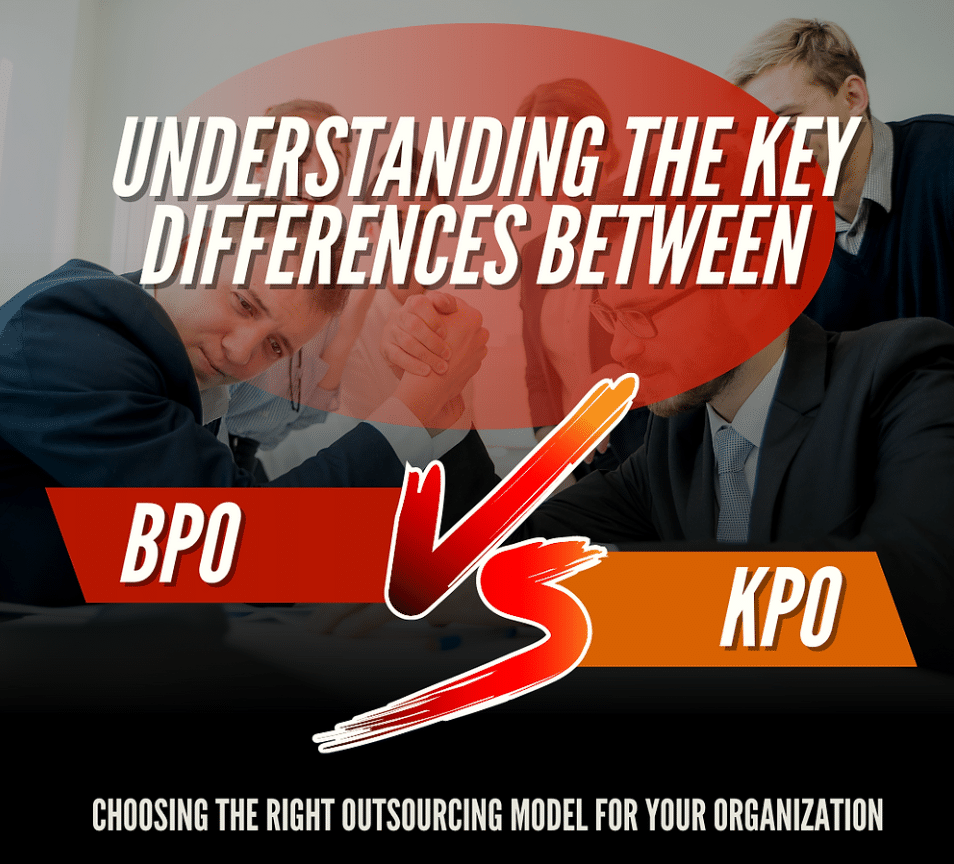
The differentiation between BPO and KPO becomes evident through the level of judgement, complexity, and expertise necessary to complete the outsourced work. While BPO might involve customer service operations, data entry, or payroll processing, KPO services encompass activities such as market research, investment analysis, or pharmaceutical research, which necessitate a professional knowledge base. Companies often turn to KPO when they need an advanced understanding of specific subject matter that goes beyond what is commonly found in a standard BPO setup. This transition is indicative of an evolution within the outsourcing industry towards more specialized and intellectually demanding functions.
Table of Contents
Key Takeaways
- BPO is associated with process-driven tasks, while KPO handles complex, knowledge-intensive services.
- The choice between BPO and KPO depends on the level of expertise and judgment required.
- KPO presents opportunities for adding strategic value through specialized knowledge and analytical skills.
Understanding BPO and KPO
In the realm of outsourcing, Business Process Outsourcing (BPO) and Knowledge Process Outsourcing (KPO) embody streamlined solutions for companies seeking efficiency in non-core activities. This section outlines the distinctions and definitions of these two forms of outsourcing to provide clarity on their roles within the business environment.
Definition of BPO

Business Process Outsourcing (BPO) refers to the delegation of specific business-related operations to a third-party service provider. It typically involves processes considered to be non-core yet essential to the business, such as customer service, data entry, or payroll. BPO aims to increase cost efficiency and allow a company to focus on its core competencies by outsourcing routine or repetitive tasks.
- Examples of BPO services: Customer support, HR administration, finance, and accounting functions
- Objective: Cost savings and operational efficiency
Definition of KPO
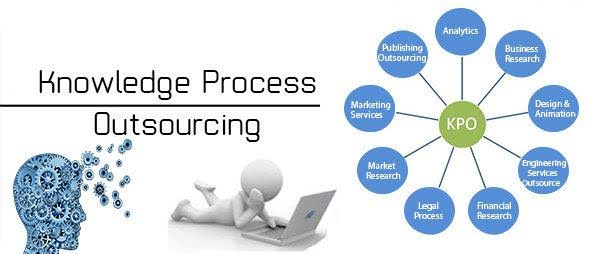
Knowledge Process Outsourcing (KPO), on the other hand, represents a more specialized extension of outsourcing. KPO centers on tasks that demand advanced analytical and technical skills, as well as domain-based expertise. Companies outsource these knowledge-intensive activities to enhance strategic functions such as market research, legal services, or business analysis.
- Characteristics of KPO: High-level of expertise, domain knowledge, and decision-making capabilities
- Focus Area: Creating added value through depth of knowledge
Comparing BPO and KPO
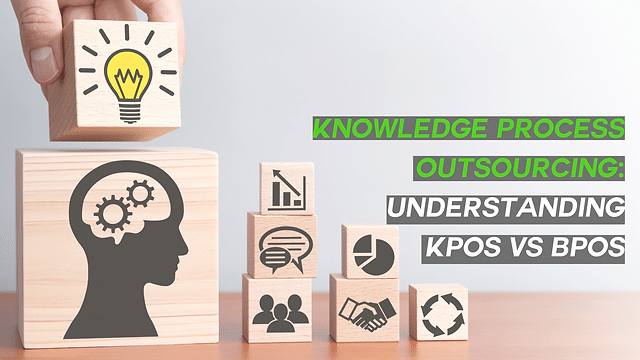
Business Process Outsourcing (BPO) and Knowledge Process Outsourcing (KPO) are distinctive outsourcing strategies that businesses employ to enhance efficiency and focus on core competencies. They differ fundamentally in their goals, complexity, and the nature of the tasks they involve.
Primary Focus
The primary focus of BPO is on operational efficiency and cost reduction. BPO services typically involve managing routine, repetitive tasks such as customer service, data entry, and telemarketing. In contrast, KPO focuses on knowledge-based services that require a higher level of subject matter expertise and analysis, such as research and development, financial consultancy, and advanced technical support.
Level of Expertise
BPO generally requires less specialized skills compared to KPO. Staff in BPO organizations might receive training on customer support or use of specific software but do not necessarily have advanced degrees. KPO, on the other hand, demands higher levels of expertise and qualifications, often needing professionals such as engineers, doctors, lawyers, and researchers who can make informed judgments and decisions.
Type of Tasks
Tasks in BPO are usually standardized and routine. Examples of typical tasks include:
- Data processing
- Technical Support
- Administrative support
- Customer Service
KPO tasks are complex and varied, relying on the professional’s expertise and involve tasks such as:
- Legal and medical services
- Business and market research
- Financial analysis
Decision Making
In BPO settings, decision-making often revolves around low-level process choices that don’t require extensive deliberation. BPO workers may have scripts or guidelines to help them decide how to handle common situations. In KPO operations, decision-making is integral to the job. Professionals engaged in KPO must exercise judgment and make high-level decisions that can significantly affect the outcomes of the processes they are involved in.
Services and Operations
This section delineates the specific services provided by Business Process Outsourcing (BPO) and Knowledge Process Outsourcing (KPO), as well as their operational differences, focusing on areas such as customer service, data entry, and legal services.
Services in BPO
BPO firms predominantly offer services that include customer support, human resources, data entry, and finance and accounting. These services are routine and process-oriented, requiring adherence to predefined protocols. For instance:
- Customer Service: Handling inquiries, complaints, and support via phone, email, or chat.
- Human Resources: Administering payroll, benefits, and employee data management.
- Data Entry: Converting paper formats to digital forms, meticulous record-keeping.
- Finance and Accounting: Managing accounts payable/receivable, bookkeeping.
From business process outsourcing to knowledge process outsourcing details the need for structured approaches to handle BPO services efficiently.
Services in KPO
Comparatively, KPO services require a higher level of expertise, analysis, and decision-making capabilities. They extend into realms like research, data analysis, legal process outsourcing, and specialized services:
- Research: In-depth market, business, or legal research, requiring a high level of domain knowledge.
- Legal Services: Legal research, drafting agreements, and case management.
- Data Analysis: Extracting actionable insights from complex data sets.
The study on KPO a step ahead of BPO explores the factors fueling the growth of KPO, underscoring their specializations.
Operational Differences
The operational frameworks of BPO and KPO are notably different. BPO operations are marked by volume-driven tasks with an emphasis on cost efficiency and standardization. Meanwhile, KPO operations are characterized by their focus on knowledge-intensive tasks that demand a certain degree of creativity and expert judgement. For instance:
- BPO operations often emphasize speed and efficiency, with success metrics tied to call handling times and resolution rates.
- KPO operations, on the other hand, prioritize depth of knowledge and expertise, with success more qualitatively measured by the insights generated or the accuracy of analysis.
A perspective on disruption in IT/ITES, particularly KPO/BPO, suggests that both sectors are evolving to embrace innovative and flexible operational models.
Industry Applications
The transition from Business Process Outsourcing (BPO) to Knowledge Process Outsourcing (KPO) represents a significant shift towards more specialized, knowledge-intensive services. Understanding this distinction is key for businesses seeking to augment their productivity and efficiency through outsourcing.
BPO Industry
Business Process Outsourcing (BPO) encompasses services where operations and responsibilities of a specific business process are contracted to a third-party service provider. Typical BPO industry applications include:
- Call Center Operations: These are quintessential BPO services, handling customer interactions across various sectors such as telecommunications, banking, and retail.
- Healthcare BPO: Outsourcing of medical billing, coding, and patient record management to improve productivity and focus on patient care.
This sector prioritizes efficiency and cost-effectiveness, often operating through economies of scale.
KPO Industry
Knowledge Process Outsourcing (KPO) involves outsourcing work that requires specialized knowledge and expertise. Entities within the KPO sector often specialize in areas such as:
- Investment Research: Providers offer analysis and research that guide financial decisions for institutions and investors.
- Market Research: Firms analyze market trends, consumer behavior, and competitive landscapes to inform business strategies.
The KPO industry enhances the intellectual capital of an organization and focuses on offering depth in knowledge-based services.
Skills and Expertise

In comparing Business Process Outsourcing (BPO) and Knowledge Process Outsourcing (KPO), the distinctions in skill sets and expertise are pronounced and pivotal. BPO focuses on skills that enable standard task execution, whereas KPO demands specialized knowledge and in-depth domain expertise.
Workforce Requirements
The workforce requirements for BPO and KPO vary significantly because of the nature of the work involved. BPO typically requires a large pool of employees with good communication skills and the ability to follow predefined processes. This often includes customer service representatives, data entry clerks, and technical support agents. Employees in the BPO industry may not necessarily possess specialized knowledge, but they should be proficient in the tasks they are assigned. On the other hand, KPO roles require individuals who bring a deep understanding and analytical capabilities to their jobs. Positions in KPO include financial analysts, research scientists, and business analysts, necessitating employee skill requirements that are more stringent and sophisticated. These employees must have the ability to understand complex concepts, undertake thorough research, and provide insights and solutions.
- BPO Employee Skills:
- Effective communication
- Process adherence
- Quick adaptability
- Basic computer proficiency
- KPO Employee Skills:
- Advanced analytical skills
- Specialized domain expertise
- Strategic thinking
- Technical proficiency
Training and Education
Training and education for these two sectors are tailored to their respective needs. In BPO, training typically focuses on process knowledge, use of specific software tools, and customer interaction protocols. The duration of training can be relatively short, aiming to equip employees with the skills needed to perform their routine tasks satisfactorily.
For KPO, however, the required training is more intensive and education-oriented, often demanding higher educational qualifications and specialized background. Employees may need to undergo extensive training to hone their domain expertise, often provided by the employers themselves or required in the form of advanced degrees and certifications. KPO positions emphasize in-depth knowledge and specialized knowledge, which necessitate ongoing education and learning to keep up with industry and sector-specific developments.
- BPO Training Focus:
- Company-specific processes
- Customer service excellence
- Tool and software functionality
- KPO Training Focus:
- Industry-specific regulations and practices
- Advanced data analysis and research methods
- Continuous professional development
Technological and Infrastructural Needs
Understanding the technological and infrastructural differences between Business Process Outsourcing (BPO) and Knowledge Process Outsourcing (KPO) is crucial. The former typically requires a robust technical framework for handling large volumes of routine tasks, while the latter necessitates advanced systems for dealing with complex, knowledge-driven processes.
Technology in BPO
In BPO settings, technology revolves around streamlining repetitive tasks such as data entry or customer service. Companies often implement Customer Relationship Management (CRM) systems and data processing software to facilitate efficient workflow. The emphasis is on innovative technology that increases productivity, with a strong necessity for data security measures to protect sensitive information. Essential technology includes high-speed internet, automated calling systems, and database management tools, which support the rapid handling of high-volume tasks with consistency.
Technology in KPO
KPO enterprises, on the other hand, demand a spectrum of advanced technologies tailored to their specialized services. They rely on computer knowledge and technical support that offer predictive analysis, research and development capabilities, and real-time data processing. Tools for project management, such as Enterprise Resource Planning (ERP) systems, and platforms that support data security are crucial, given the nature of the knowledge-intensive tasks. Technology in KPO, therefore, needs to accommodate the intricacies of services such as financial analysis, biotechnology research, or legal process outsourcing.
Infrastructure Considerations
Regarding infrastructure, BPO typically requires a functional space that can house a large workforce equipped with reliable computers and telecommunication systems. Infrastructure must be scalable and capable of supporting peak load times, ensuring continuous service delivery. KPO, contrasting with BPO, must not only provide a similar foundational infrastructure but also invest further in specialized resources and training facilities. Additionally, KPOs focus on creating an environment conducive to analytical thinking and problem-solving, often necessitating the inclusion of collaborative workspaces and access to proprietary databases and libraries. Both BPO and KPO sectors have to maintain an agile infrastructure to adapt to rapid technological changes and safeguard against potential cyber threats.
Global Outsourcing Dynamics
The landscape of global outsourcing is multifaceted; crucial factors include location strategies such as offshore, nearshore, and onshore as well as the advancing sector of Knowledge Process Outsourcing (KPO) which shifts the focus towards knowledge-intensive activities.
Offshore, Nearshore, and Onshore BPO
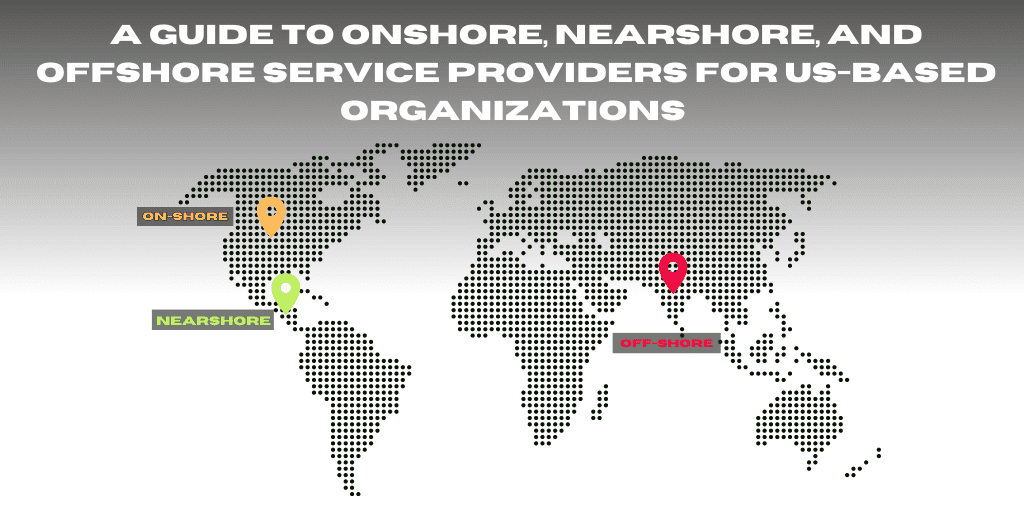
Offshore BPO refers to the relocation of business processes to a distant country, often to capitalize on cost advantages and access to a larger talent pool. It is characterized by significant time zone differences and a focus on cost reduction through labor arbitrage. Industries often outsource customer service or data entry tasks to countries such as India or the Philippines.
In Nearshore BPO, a company moves its business processes to a neighboring or nearby country. This approach allows for closer cultural ties, reduced time zone differences, and often, easier communication and travel. Nearshore BPO is popular in the US with countries like Mexico or Canada, where geographical and temporal proximity ease business interactions.
Onshore BPO, also known as domestic outsourcing, happens when a company delegates processes to a service provider within the same country. This can offer advantages such as shared regulatory frameworks, language, and cultural affinity. Onshore BPO is particularly appealing for those looking to maintain tighter control and coordination in their operations.
Impact of KPO on Outsourcing Trends
KPO represents a shift towards offshore outsourcing of complex, knowledge-based activities, moving beyond the traditional scope of BPO services to include research, analytics, and technical expertise. It relies on highly specialized knowledge and skills that are leveraged to provide strategic insights and decisions, often referred to as knowledge arbitrage.
The growth of KPO signals a move up the value chain for many offshore destinations, impacting the global outsourcing trends by introducing services that require a higher degree of expertise and education, such as legal analysis, investment research, and advanced market analytics. KPO fosters an environment where intellectual capital becomes the key value proposition, differentiating itself from the process-driven model of traditional BPO.
Strategic Benefits and Challenges
When comparing Business Process Outsourcing (BPO) and Knowledge Process Outsourcing (KPO), both offer strategic benefits and encounter various challenges. These can range from cost considerations to impacts on efficiency and productivity, as well as differences in scalability and flexibility.
Cost Considerations
BPO is often pursued for its cost arbitrage advantage, allowing companies to significantly reduce operational expenses by utilizing lower-cost labor markets. In contrast, KPO services, while still cost-effective compared to in-house alternatives, command a higher price due to the specialized knowledge and expertise required. According to the literature, the risk of diminished quality can overshadow cost savings if not managed carefully, which pertains to both BPO and KPO engagements.
Efficiency and Productivity
KPO’s edge lies in enhancing business efficiency and productivity through specialized knowledge—firms gain access to expert skills without the expense of developing them in-house. A study observed that buying KPO services can be particularly advantageous for SMEs, enabling them to leverage expert support to streamline their operations. In comparison, BPO primarily focuses on efficiency through process standardization and bulk handling, which can lead to large-scale improvements in operational productivity.
Scalability and Flexibility
The choice between BPO and KPO can influence a company’s scalability and flexibility. BPO providers generally offer a rapid scaling of operations, making it easier for organizations to adjust to market demands without the burden of long-term investments in personnel or infrastructure. However, with KPO, scalability is nuanced by the need to maintain a certain level of expertise, which can constrain quick adjustments. Nevertheless, the strategic benefit comes from the potential to adapt and grow intellectual capabilities with market or business requirements, promoting long-term flexibility.
Quality and Performance Management
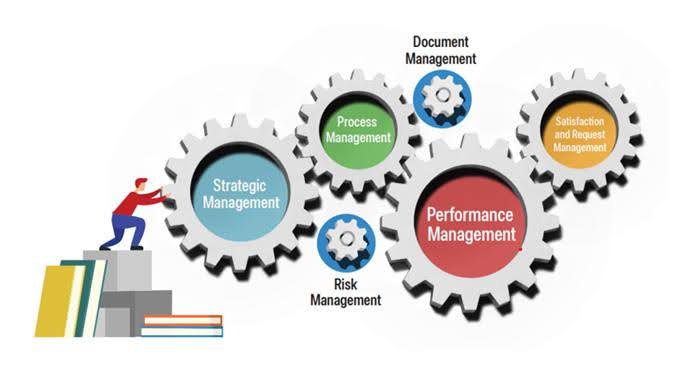
In the competitive landscape of outsourcing, the distinction between Business Process Outsourcing (BPO) and Knowledge Process Outsourcing (KPO) is significantly marked by their respective approaches to quality and performance management. These strategies are pivotal in delivering value to clients and gaining an edge in the marketplace.
Quality Control in BPO
Business Process Outsourcing (BPO) typically involves processes that are more standardized and repetitive. Here, quality management is often quantified through meticulous data management systems, which track performance metrics such as response times and error rates. For instance, clear protocols are installed to ensure consistency in customer call handling or data entry tasks. Companies may employ tools like Six Sigma and Total Quality Management (TQM) to minimize errors and uphold efficiency. A study examining performance management in the BPO sector highlights structured and periodic reviews integral to enhancing performance systems.
- Metrics Monitored:
- Average Handle Time (AHT)
- Customer Satisfaction Score (CSAT)
- First Call Resolution (FCR)
Quality Control in KPO
Knowledge Process Outsourcing (KPO), on the other hand, necessitates a deeper focus on domain knowledge and advanced data management capabilities, since these services revolve around knowledge-intensive activities. Quality control in KPO extends to intellectual value, hence performance management is closely tied to subject matter expertise and the outcome’s real-world application. As one insight into the operational profile of KPOs suggests, they prioritize certified quality management processes that underpin the trust and reliability in their services, embarking on continuous quality improvement.
- Quality Attributes Monitored:
- Accuracy of analysis
- Intellectual property adherence
- Process innovation
The quality management systems in both BPO and KPO are integral to maintain the high standards expected by clients, but the nature of the underlying processes dictates distinct strategies and metrics for each. The performance management systems are structured to reflect the complexity and uniqueness of the tasks at hand, underscoring a commitment to constant improvement in an ever-evolving marketplace.
Legal and Regulatory Compliance
In the spheres of Business Process Outsourcing (BPO) and Knowledge Process Outsourcing (KPO), legal and regulatory compliance plays a pivotal role. These entities must navigate complex legal processes and adhere to strict data protection standards to maintain operational legitimacy.
BPO Compliance Issues
Business Process Outsourcing (BPO) organizations often handle voluminous transactions, which include sensitive customer information. They are required to comply with various international regulations such as the General Data Protection Regulation (GDPR) and local data protection laws. BPOs ensure compliance by implementing robust security measures and data management systems to safeguard against data breaches and unauthorized access.
Key Aspects of BPO Compliance:
- Maintaining data integrity and privacy
- Adhering to client-specific legal requirements
KPO Compliance Issues
Knowledge Process Outsourcing (KPO) firms, which specialize in providing domain-based processes and analytical services, also operate under stringent legal frameworks. There’s an increased emphasis on intellectual property (IP) rights since KPOs often deal with legal services, financial analysis, and other specialized knowledge sectors. Compliance in a KPO involves staying abreast of various international and sector-specific regulatory standards.
Essential Elements of KPO Compliance:
- Upholding strict intellectual property protections
- Complying with sector-specific regulatory mandates
Future of Outsourcing
Outsourcing is evolving, with emphasis on higher-value services and the integration of innovation into traditional processes. The landscape is shifting towards more specialized domains, where expertise-driven support can offer greater strategic benefits.
Innovation and Development
The forefront of outsourcing’s evolution is marked by a significant thrust toward innovation. Companies now recognize that outsourcing partnerships can be a rich source of creative solutions, beyond cost-saving measures. In particular, the Knowledge Process Outsourcing (KPO) sector is set to benefit from this trend, with businesses increasingly seeking out partners that can provide advanced business research, development support, and innovative strategies to stay ahead in a competitive market.
Growing Sectors
In terms of growing sectors, KPO is expanding into areas such as financial services, legal services, and healthcare, where specialized knowledge is crucial. A report on financial services outsourced through KPO signifies this transition. Furthermore, businesses are expanding their wings to include these sectors foreseeing profitable opportunities, as supported by a review of trends in the Indian BPO industry.
A study indicates that the maturity of India’s BPO sector has spawned the growth of KPO, suggesting a future where expertise and process innovation take center stage (KPO a step ahead of BPO). This marks a strategic shift from sheer volume outsourcing to value-driven outsourcing—positioning KPO as a key player in the future landscape.
Making the Right Choice
When businesses contemplate outsourcing, they must differentiate between Business Process Outsourcing (BPO) and Knowledge Process Outsourcing (KPO). This decision hinges on the company’s core functions and core competencies, as well as its strategic goals.
BPO typically involves outsourcing routine, administrative tasks such as customer service, data entry, or payroll. On the other hand, KPO goes a step further to outsource tasks that demand specialized knowledge, such as research & development, financial analysis, or legal processes.
Core Functions
- BPO: Administrative, repetitive tasks.
- KPO: Specialized, analytical tasks.
Core Competencies
Businesses should consider their strengths. If a business specializes in data-driven decision-making, leaning towards KPO may harness more of its inherent competencies. For indirect functions not intrinsic to their brand, BPO could be the smarter route.
Common Benefits
The common advantages of both BPO and KPO include cost savings, increased efficiency, and access to global expertise. However, KPO offers the added benefit of high-level intellectual value and insights, crucial for strategic decision-making.
Strategic Decision Making
A decisive factor is the level of control needed over the processes. KPO arrangements require a partnership approach with substantial communication and strategic alignment. Choosing KPO implies a company’s willingness to invest in long-term growth through strategic expertise.
Companies should assess their operational needs and goals thoroughly to make the right choice between BPO and KPO services. Although each comes with distinct advantages, the decision must align with the company’s vision and the value it seeks from outsourcing.
Conclusions
In comparing Business Process Outsourcing (BPO) with Knowledge Process Outsourcing (KPO), one observes key distinctions. BPO typically involves standardized processes, whereas KPO services demand advanced analytical and specialized skills.
KPO Emergence: Firms have transitioned from BPO to more complex KPO tasks, requiring a higher level of expertise and involvement in core business areas. Evidence suggests a growth trend in KPO, indicating its strategic alignment with long-term business insights.
- Strategic Impact: KPO’s strategic nuance lies in its contribution to innovation and competitive advantage, uniquely positioning firms through domain-specific knowledge.
- BPO Stability: Despite the rise of KPO, BPO remains a stable foundation for companies looking to optimize costs and improve operational efficiency.
Industry experts postulate that KPO offers a value-added proposition with potential to reshape business dynamics. For example, KPO services have significantly more impact on core business functions and decision-making processes.
| BPO | KPO |
| – Cost efficiency | – Domain expertise |
| – Standardized processes | – Complex problem-solving |
| – Operational support | – Strategic business value |
In summary, businesses are encouraged to weigh the cost-benefit implications of both BPO and KPO. Choosing the right outsourcing strategy depends on the nature of the process, the desired outcome, and the strategic insights derived from domain-specific knowledge. The continuous evolution in this sector is keenly observed, and companies are advised to stay abreast of these developments.
Frequently Asked Questions
Understanding the differences and applications of BPO and KPO is critical for businesses looking to optimize their operations and leverage global talent.
What distinguishes Business Process Outsourcing (BPO) from Knowledge Process Outsourcing (KPO)?
BPO involves outsourcing repetitive and process-oriented tasks, such as data entry or customer support, primarily focusing on cost-efficiency and standardization. In contrast, KPO is about delegating knowledge-intensive activities, which require specialized skills and expertise, such as market research or legal analysis, aiming to benefit from specialized knowledge and not just cost savings.
Can you explain how KPO adds value to an organization differently than BPO?
KPO provides value by empowering organizations to access niche skills and advanced analytical capabilities that drive informed decision-making and innovation. Unlike BPO, which streamlines operations, KPO enables deeper insights and strategic advantages through its focus on knowledge-intensive tasks.
What are some examples of services typically handled by BPO companies?
Services typically handled by BPO companies include customer service, technical support, telemarketing, data entry, payroll, and bookkeeping. These services are often standardized across various industries, requiring process efficiency and scalability.
In what ways does KPO require a different skill set compared to BPO?
KPO requires a higher level of expertise and education because it deals with complex tasks such as investment research, business analytics, or legal services. KPO professionals often hold advanced degrees and possess specialized knowledge in their respective fields, distinguishing the workforce of KPO from the more process-driven BPO sector.
How do BPO operations differ from call centers?
BPO operations have a broader scope encompassing a wide range of back-office and front-office tasks that might include call center services. However, call centers specifically focus on handling customer engagements via telephone and, increasingly, through other digital communication channels.
What is the role of Research Process Outsourcing (RPO) in comparison to BPO and KPO?
RPO is a subset of KPO where the focus is specifically on research-related activities. While BPO and KPO may include operational and knowledge-intensive processes, RPO centers on conducting various forms of research such as market research, legal research, or business research, often requiring an even more specialized set of skills.
Last Updated on February 20, 2024 by Ronen Ben-Dror

